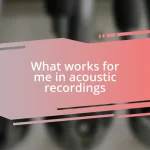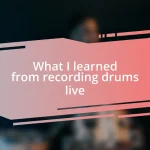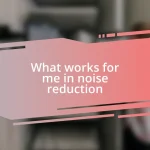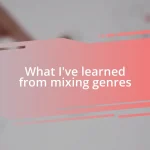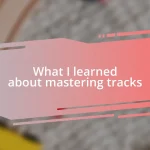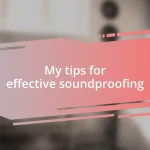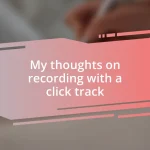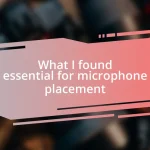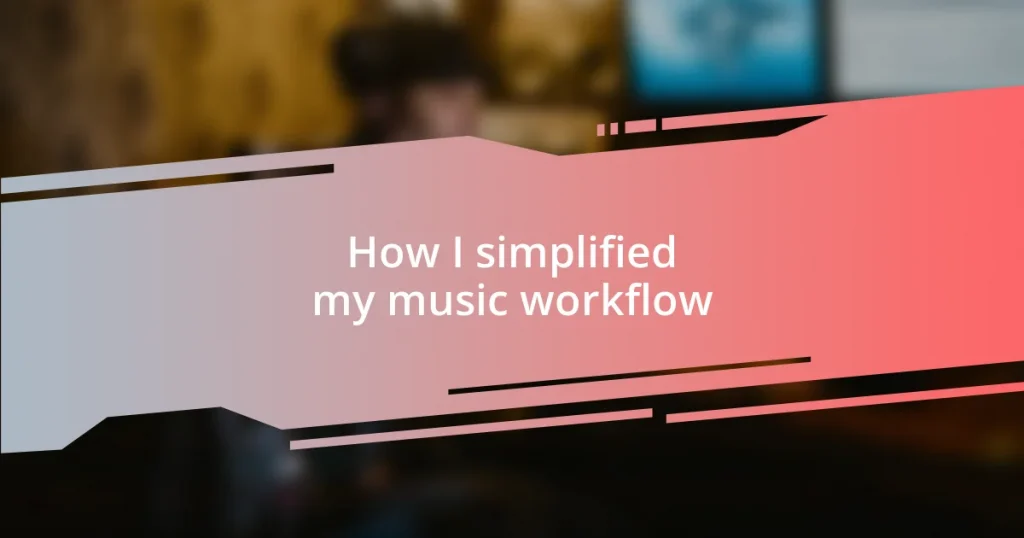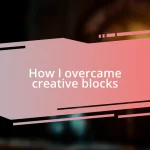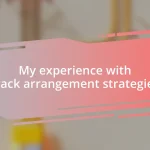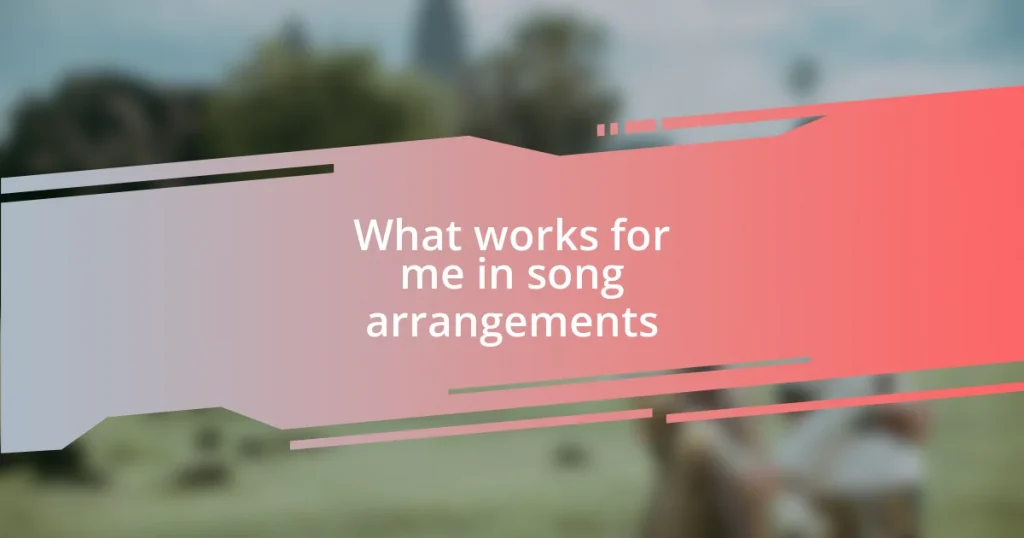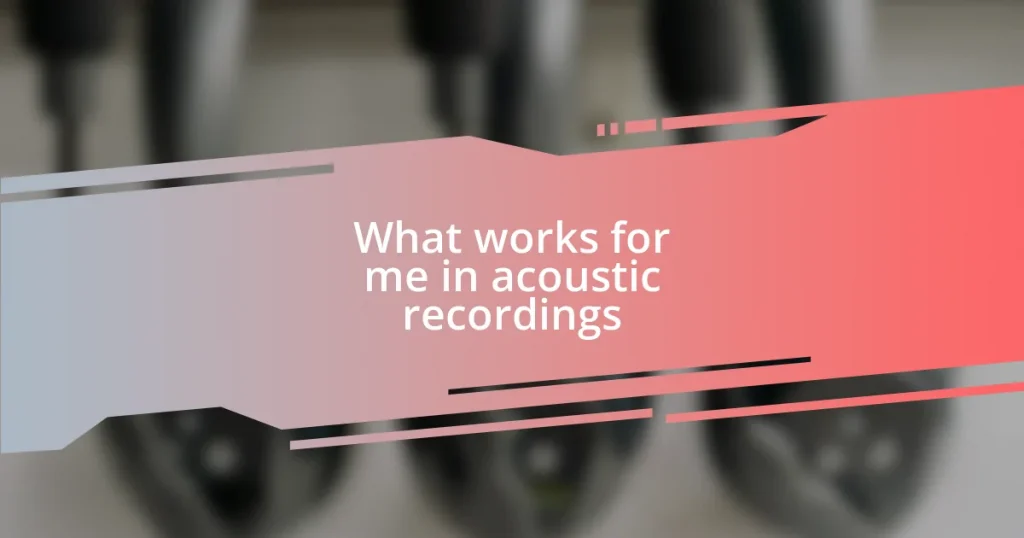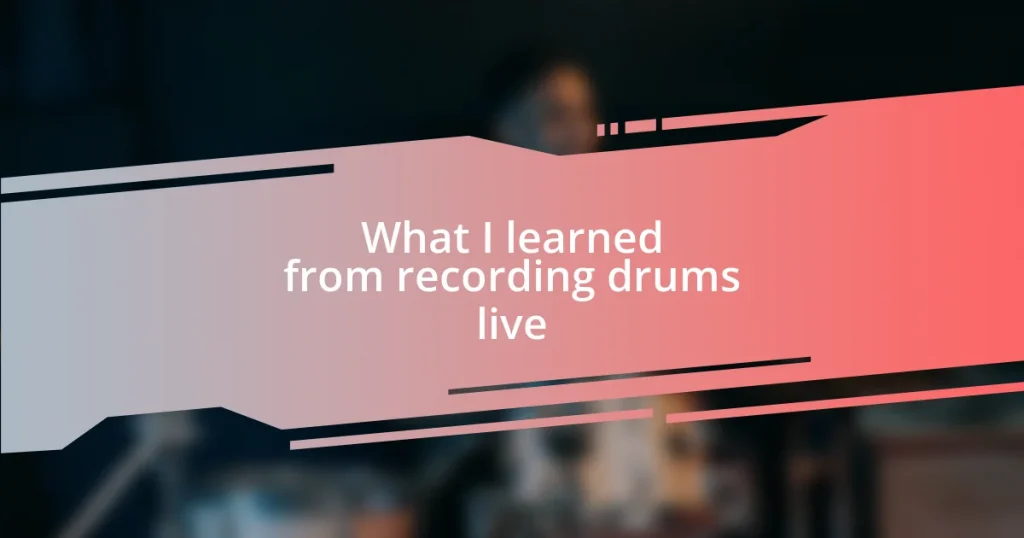Key takeaways:
- Understanding and streamlining your workflow can significantly enhance both productivity and creativity in music production.
- Identifying and addressing bottlenecks, such as time management and decision fatigue, is crucial for maintaining an efficient creative process.
- Regular evaluation of progress and adaptability in your workflow can lead to continuous improvement and renewed inspiration in your music-making journey.
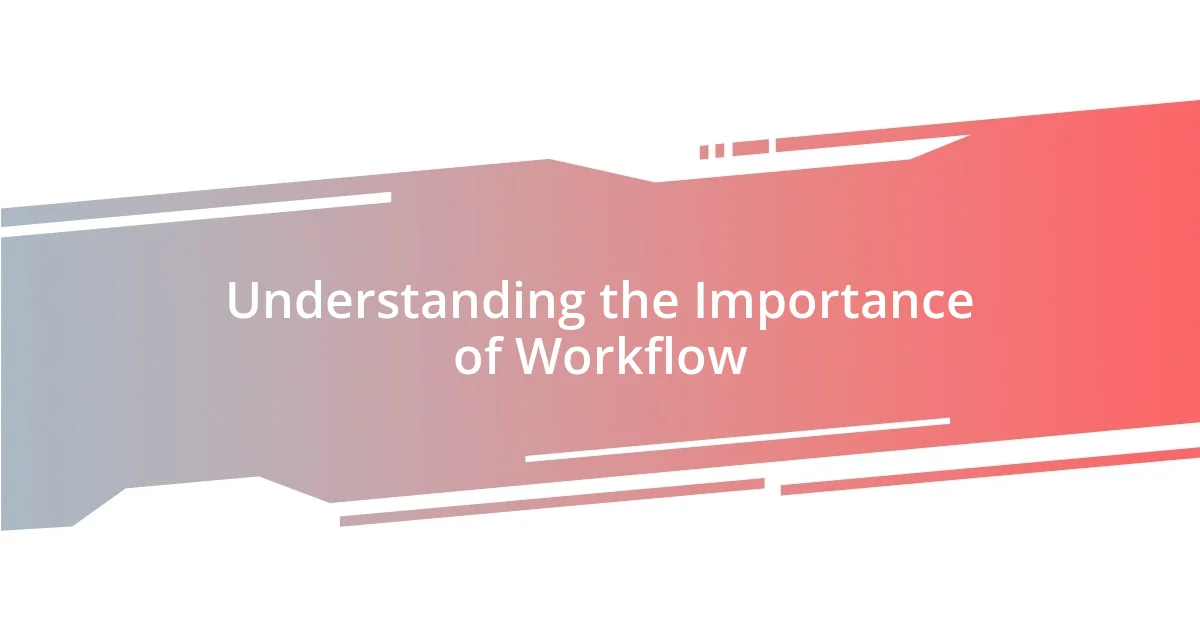
Understanding the Importance of Workflow
When I first started making music, I often found myself overwhelmed by the sheer number of tasks and decisions to juggle. It was like trying to find my way through a dense fog, and this lack of clarity was draining. I realized that understanding my workflow wasn’t just about organization; it was about finding joy in the creative process.
Have you ever had one of those days where everything just clicks? That’s what an efficient workflow can do for you. I remember the first time I streamlined my process—suddenly, I had more time to experiment and explore different sounds. It felt liberating! This taught me that a well-structured workflow can enhance not only productivity but also creativity.
Looking back, I can see how critical the right workflow has been for my music production. It’s not merely a collection of steps; it shapes the way I approach my work. As I established routines, I started to build momentum, and each project became less daunting and more fulfilling. Isn’t it incredible how a little structure can lead to such rewarding experiences?
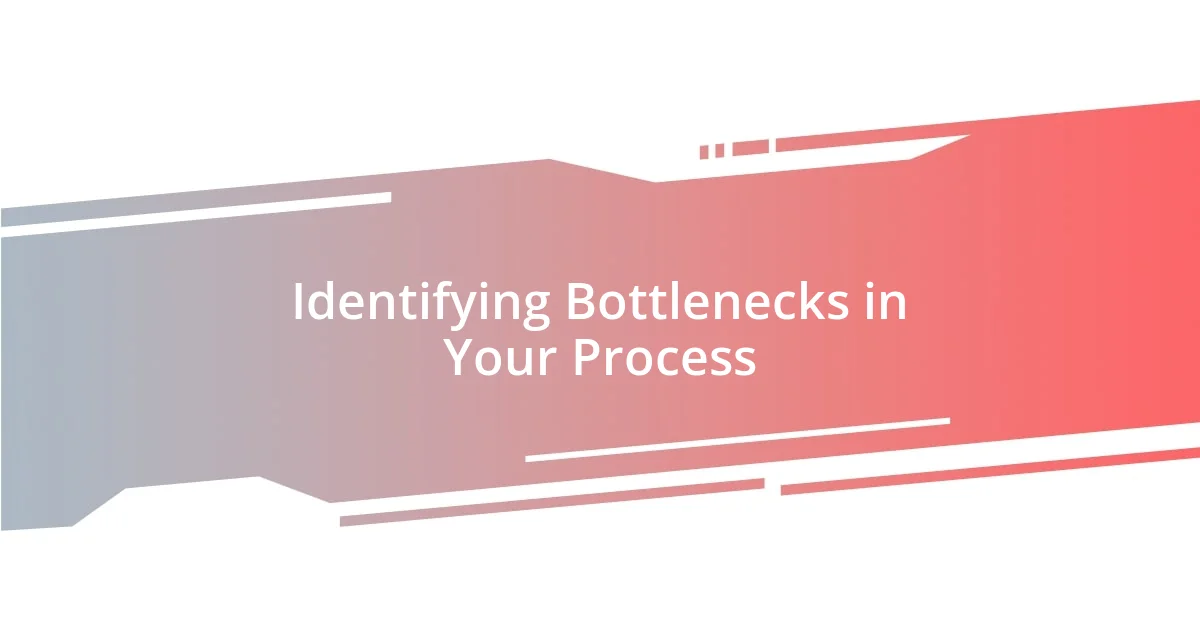
Identifying Bottlenecks in Your Process
Identifying bottlenecks in your music production process can be a game-changer. I remember the frustration I felt when I’d spend hours perfecting one element but it still didn’t fit the overall track. Looking back, I realized that taking the time to analyze where I was getting stuck was essential. By mapping out my workflow, I could see patterns—like always getting stuck during the mixing phase. This awareness made it easier to address these slowdowns and enhance my overall efficiency.
Sometimes it’s about the smaller tasks that seem insignificant but pile up over time. For example, I used to spend too much time deciding on sounds instead of just jumping in and exploring. Once I recognized this as a bottleneck, I started keeping a “go-to” list of my favorite sounds. This simple change freed me to focus more on creativity rather than decision fatigue.
Even when you think you have a solid workflow, it’s crucial to remain vigilant about bottlenecks. After analyzing my process, I discovered that lack of breaks was slowing me down. I incorporated regular pauses, which surprisingly boosted my creativity. Have you ever noticed how stepping away can give you fresh perspective? It’s amazing how addressing these little hurdles can lead to significant improvements in your overall workflow.
| Bottleneck Type | Description |
|---|---|
| Time Management | Spending excessive time on one task, like mixing, that halts progress. |
| Decision Fatigue | Overthinking choices, such as sound selection, leading to unproductive sessions. |
| Insufficient Breaks | Working too long without breaks, reducing creativity and focus. |
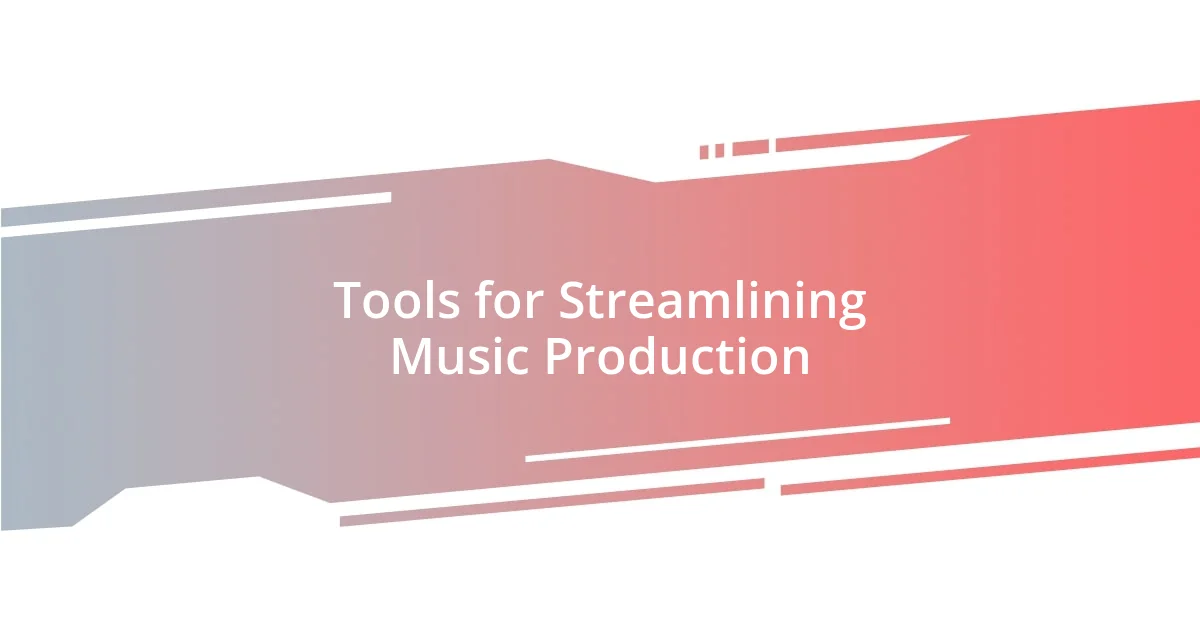
Tools for Streamlining Music Production
When it comes to simplifying my music production workflow, the right tools have made a world of difference. I still remember how using a digital audio workstation (DAW) for the first time helped me visualize my entire project. It felt like having a blank canvas rather than a cluttered desk. A well-chosen DAW allows you to organize tracks, manage samples, and edit with ease, making the process smoother and more enjoyable.
Here’s a quick list of tools that have streamlined my music production:
- DAW (Digital Audio Workstation): Central hub for composing, recording, and editing. I love how Ableton Live makes it easy to experiment with my ideas.
- Sample Libraries: Having a curated sample library can be a lifesaver. They let me quickly pull in sounds that fit my projects without digging through countless folders.
- Plugins: Whether it’s synths or effects, plugins like Serum or Valhalla Room add depth to my tracks. They often help me realize sounds I didn’t even know I wanted to create.
- Project Management Tools: I’ve found that using tools like Trello, helps keep my projects organized and on track, ensuring I meet my deadlines without sacrificing creativity.
- Cloud Storage: Storing my projects on platforms like Google Drive enables me to access my work from anywhere, which is fantastic for inspiration on the go.
These tools transform chaos into clarity, allowing me to focus on what truly matters: the music. I can’t stress enough how essential it is to find the right blend of resources that resonate with your workflow.
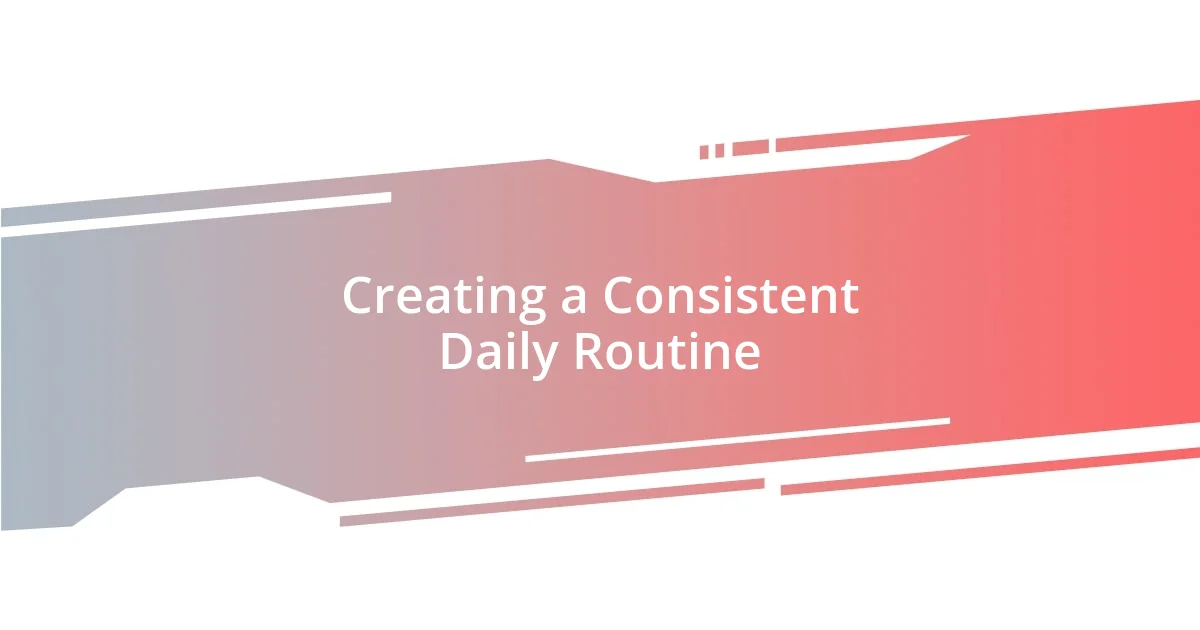
Creating a Consistent Daily Routine
Establishing a consistent daily routine has been a pivotal part of my music workflow transformation. I found that dedicating specific hours to music creation not only helps me stay organized but also builds a mindset where creativity thrives. Have you ever noticed how a lack of structure can lead to chaotic sessions? I’ve been there—days where I’d sit down to produce, only to scroll through social media instead.
When I first experimented with a consistent routine, I tried blocking out time in the morning for composing. That was my most creative time, and I could feel the ideas flowing. I remember feeling a rush of excitement as melodies came together effortlessly. Imagine feeling that spark every day! It wasn’t just about setting aside hours; it was about creating a sacred time for my art, free from distractions. That’s when I realized how vital it was to respect those hours as I would any important meeting.
Additionally, I started tracking my progress at the end of each week. Just jotting down what I accomplished transformed my outlook and kept me motivated. I even began to celebrate those small wins, like completing a rough mix or finally nailing the arrangement of a track. These practices not only made my workflow more enjoyable but cultivated a sense of accountability. Isn’t it incredible how a simple routine can foster profound creativity?
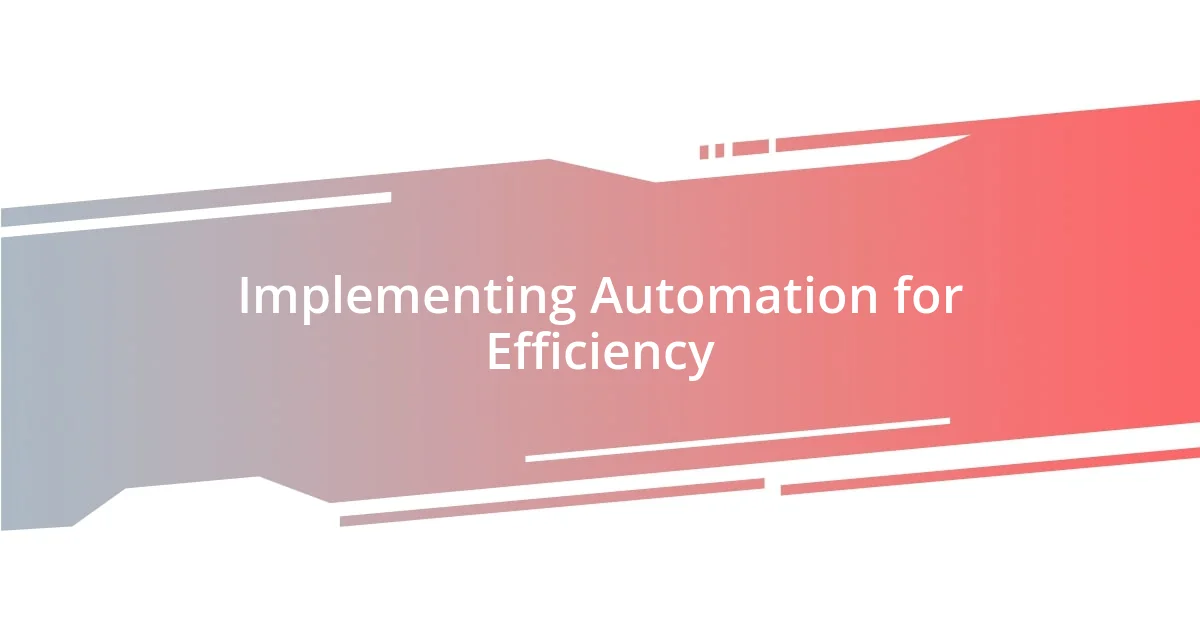
Implementing Automation for Efficiency
Implementing automation in my music workflow has truly revolutionized the way I create. I remember the first time I set up a MIDI controller to trigger my virtual drum kit—it felt like having a live drummer in my studio. Have you ever had one of those moments where technology just clicks? Using automation to handle repetitive tasks allows me to focus on the art rather than getting lost in the details.
One of my favorite automations involves setting up my DAW to handle effects like reverb and compression on specific tracks automatically. This means I can produce a clean, polished sound without spending hours tweaking settings. It’s like having a personal sound engineer who never sleeps—what a game-changer! I often find myself smiling at how seamless my workflow has become; it’s almost as if the music simply flows through me now.
I also utilize automation for my mixing processes by creating dynamic volume adjustments throughout my tracks, ensuring that each instrument has its moment to shine. It’s fascinating how a little automation can turn an ordinary mix into an extraordinary experience. Have you tried automating your mixes? I encourage you to play around; it’s a revelation that can elevate your music in ways you might not expect!
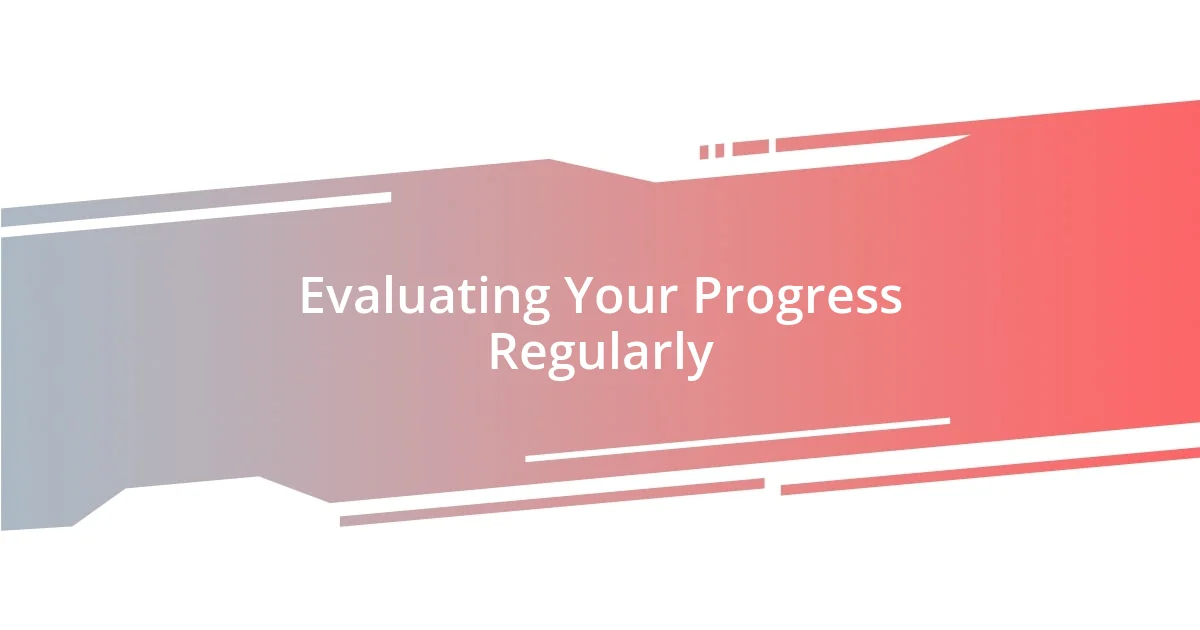
Evaluating Your Progress Regularly
Monitoring my progress regularly is something that I’ve learned to prioritize in my music journey. Initially, I’d just create without reflecting, which often left me questioning whether I was actually improving. Now, I set aside time every month to listen back to my old tracks. It’s amazing how much growth I can see—and hear! Have you ever been astonished by your own evolution? I certainly have; it’s like unearthing a treasure trove of personal achievements.
Incorporating a simple checklist has also transformed my evaluation process. After each creative session, I ask myself what worked well and what didn’t. I recall one session where I struggled with a particular section in a song. When I reviewed it later, I realized that the issue was more about my mindset than my skills! This insight not only helped me tweak my approach but reminded me that our perceptions can often cloud our progress. It’s fascinating how a little reflection can shine light on our creative blocks, isn’t it?
I’ve found that sharing my progress with fellow musicians has been invaluable too. By discussing my goals and challenges with others, I gain fresh perspectives and constructive feedback. There was a moment when a friend pointed out a repetitive pattern in my work that I had completely missed. This wasn’t just about constructive criticism; it was a lightbulb moment that pushed me to experiment more boldly. Do you have a community to share your work with? It could be the key to unlocking new creative pathways!
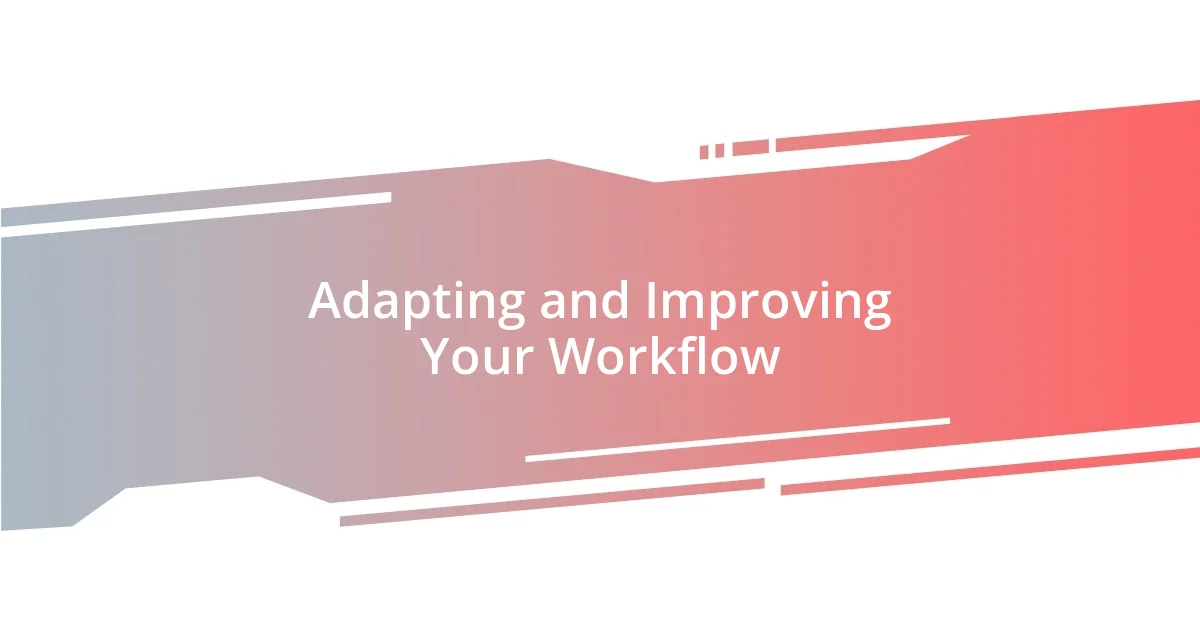
Adapting and Improving Your Workflow
When it comes to adapting my workflow, I’ve found that flexibility is essential. I often revisit my methods and ask myself: what can I change to make the process smoother? Recently, I switched from a linear workflow to a more modular one, allowing me to work on different sections of a song independently. This shift not only keeps my creativity flowing but also makes it easier to experiment with sounds without the fear of ruining what I’ve already created. Have you ever felt stuck in a certain way of working? Sometimes, a small tweak leads to surprising discoveries.
Another game changer for me has been embracing new tools. I remember the first time I tried a new app for organizing my music ideas—it was as if a weight had been lifted off my shoulders. Instead of scribbling notes on random papers and forgetting where I stored them, everything became digital and easily accessible. It’s incredible how technology can enhance creativity, isn’t it? By continually exploring different software and plugins, I’ve discovered a wealth of possibilities I hadn’t even considered before. What tools have you experimented with lately that sparked your creativity?
Finally, I’ve learned the importance of taking breaks to recharge my creative spirit. There have been days when I felt overwhelmed by ideas and tasks, and stepping away for a short walk or doing something completely different has been surprisingly effective. When I return, I often notice the music flows more naturally, and my enthusiasm reignites. Have you ever noticed how a little distance can give you fresh insight? It’s during those breaks that some of my best ideas emerge, and I wholeheartedly encourage you to embrace taking time for yourself in your workflow too!

